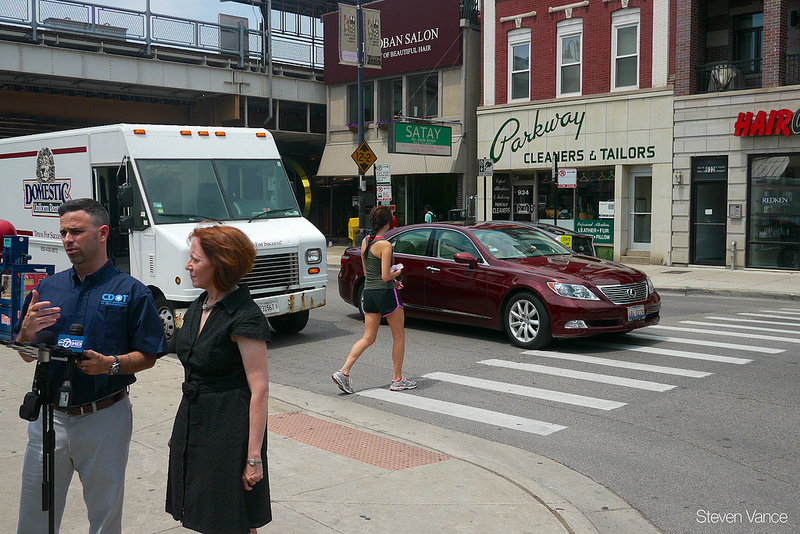Friday's budget hearing for the Chicago Department of Transportation was a reminder that it's sometimes best to avoid painting an alderman as purely a sustainable transportation hero or villain, because things are often more complicated than that.
For example, Lincoln Park representative Michele Smith deserves credit for supporting CDOT's proposal for a traffic-calmed "neighborhood greenway" on Dickens Avenue, despite some truly next-level Not In My Backyard-style opposition. But some of her comments at Friday's hearing, as reported by The Daily Line's Alex Nitkin, about Chicago's Vision Zero program to prevent serious and fatal crashes were misguided.
Since this is getting some attention, here's my transcription of Smith's full comments on lighting/Vision Zero: pic.twitter.com/DUDkurBKkd
— Alex Nitkin (@AlexNitkin) October 30, 2020
Smith was arguing that if there are going to be CDOT budget cuts, it would be best to reallocate funding from Vision Zero to better sidewalk and street lighting to help prevent seniors from tripping and to discourage robberies. "Yes, there are intersections with bike safety [issues], where people are killed. But one death versus hundreds of people who are routinely injured or more -- I'm going to be brave enough to say I'd rather choose helping people from being injured all the time then spending huge amounts of money trying to figure out how to avoid one death."
There was a major backlash to the alderman's comments on Twitter. Someone even created a parody account for Smith with the tagline "trading lives for ankles."
Have you ever tried to walk down a street with no lighting? You can't see anything. Your vision is zero!
— Alderman Smith (@AldermanSmth43) November 1, 2020
The problem with Smith's logic is that she's viewing safety in public space as a zero-sum game, promoting the notion that having a Vision Zero program diverts money from effective lighting. In reality, good street lighting is part of of the city's toolbox of strategies to create safer conditions for walking, biking, transit use, and driving as part of Vision Zero, also including things like pedestrian islands, protected bike lanes, bus bump-outs, and speed feedback signs.
In reality, Vision Zero isn't about spending lots of money to prevent a single bike death, but rather it's about creating a built environment and a culture of safety so that injuries and fatalities become much less common, with the goal of eliminating traffic deaths altogether. As for the question of whether it's worth investing a significant amount of money to prevent a single death, I'm guessing that the loved ones of traffic violence victims who lived in, or were killed in, Smith's Ward like William Meritt, a constituent who was fatally struck last May, would disagree.
.@AldermanSmith43 One of those deaths was William Meritt who lived in your ward (https://t.co/LzoLvgtMBh) and there have been 215 cyclist and 558 ped injuries in your ward (60614) this year. Please reconsider your stance on #VisionZero.
— 🚅🚍 Jeremy 🗺 Frisch 🚲🛴 (@ITSoFRISCHial) October 31, 2020
But there were also some words of wisdom on traffic safety at Friday's hearing from an unlikely source. Downtown alderman Brendan Reilly is best known to Streetsblog readers as the guy who blocked CDOT from installing Divvy stations on Michigan Avenue; tried to get the Kinzie protected bike lane removed; helped get pedicabs banned from downtown streets; got a Lakefront Trail underpass locked at night; and unsuccessfully tried to ban cycling on the Chicago Riverwalk, which was originally funded as a cycling route. But Reilly said some smart things about vehicle speeds at the meeting.
Predictably, other aldermen like Maria Hadden from Rogers Park and Anthony Beale, who represents parts of Riverdale and other Far South Side communities, pushed back on Mayor Lori Lightfoot's recent proposal to start issuing speed tickets to drivers doing 36 mph in a 30 zone. (I actually agree that the current health/economic/racial justice crisis is a bad time for a new crackdown.)
But during the hearing Bob Gallo, state director of the AARP, argued that Chicago should lower the default downtown speed limit, and maybe even citywide, from 30 to 20 mph, similar to initiatives in cities like New York, to reduce pedestrian deaths, according to a report from Block Club Chicago's Justin Lawrence. “I think it’s worth taking a good hard look at," Reilly responded. "I represent … a lot of pedestrians, and our constituents are a lot of those casualties and fatalities resulting from those crashes,” he said.
CDOT chief Gia Biagi said there were no plans to lower the downtown speed limit, but noted that doing so would save lives, Block Club reported. “If you’re going 20 mph and you hit that person, that person has a 90 percent chance of surviving, you go 30 it’s cut to 50 percent and if you go 40 it’s cut to 10 percent survival rate,” she noted. "So we’re definitely interested in that. Have we made a decision on that in the central business district, no.”
So if Alderman Reilly is able to get a default 20 mph speed limit implemented downtown, let alone citywide, that will help make streets safer and more livable, not to mention improving his cred with traffic safety and livable streets advocates.





